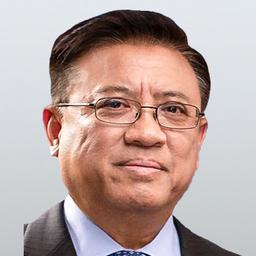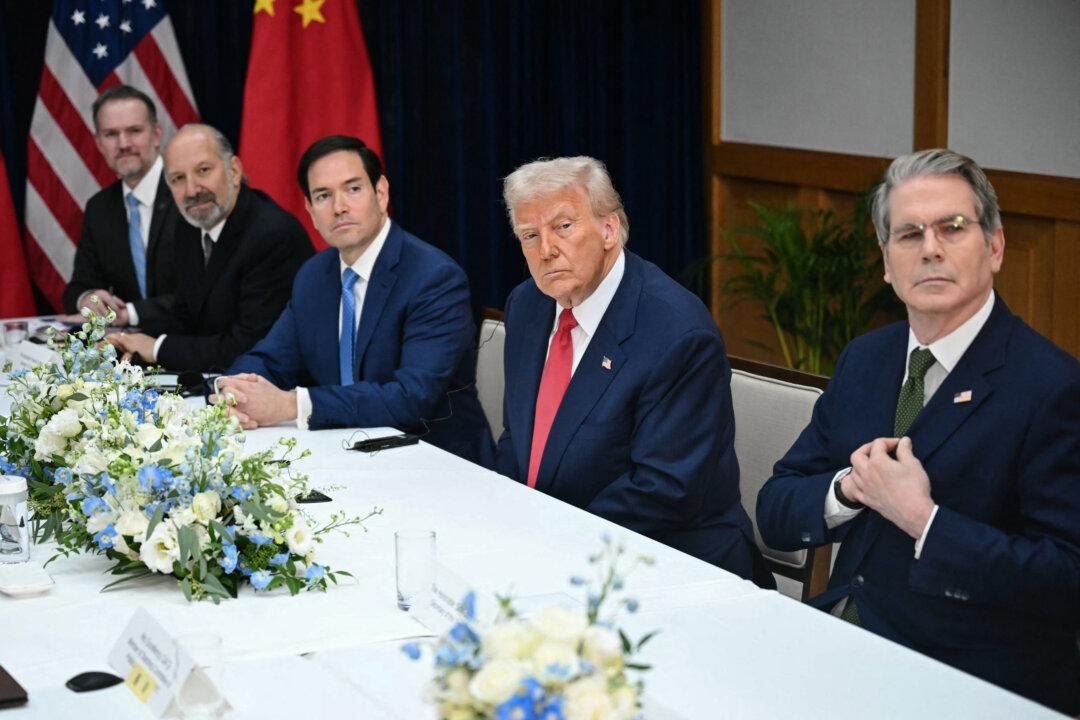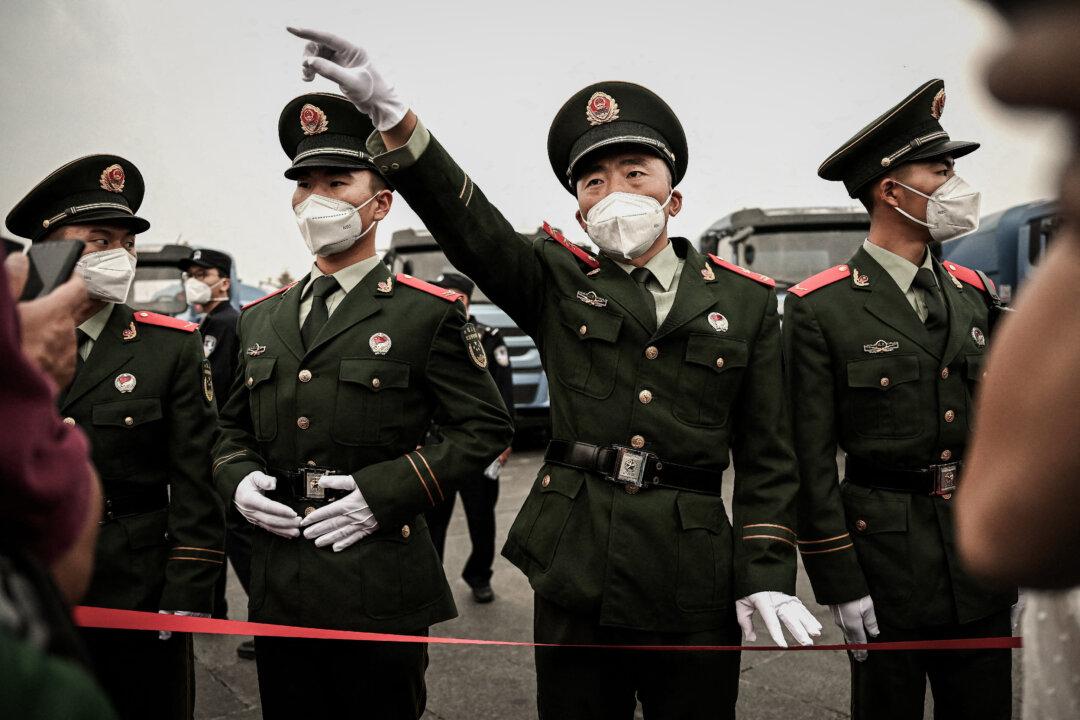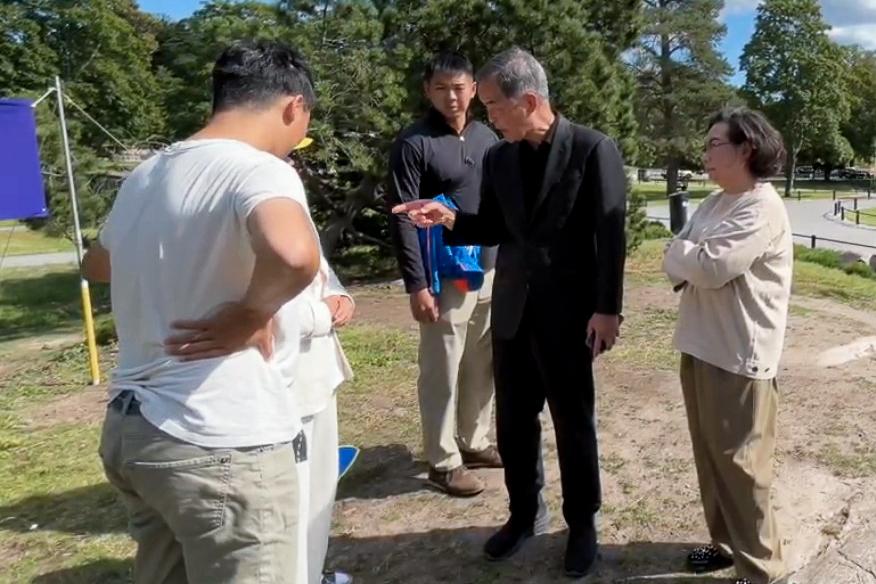On June 26, the German weekly magazine Der Spiegel published the article “Espionage.” This article tells a story about actions that are happening every day in Western countries but have been ignored for too long, actions that show a foreign power developing resources that slowly corrode the West’s independence.
The story is very much like the kind of thing that happened during the Cold War. This time, though, the intelligence agents are from China, which is for many a sought-after trade partner. The target is neither a government defense agency nor a corporation’s trade secrets, but those who practice the spiritual meditation discipline of Falun Gong.
Sun Dan [not his real name], a Chinese national, a scholar, and a German citizen, found himself in a difficult situation when his father in China became sick. Because he is a Falun Gong practitioner, his visa application became very complicated.
The visa officer at the Chinese Embassy in Berlin arranged for Sun to meet two men from China in March 2006 at a restaurant in downtown Berlin. German intelligence believes that the visa officer also works for the Chinese intelligence agency called the Ministry of State Security.
Beginning in 2008, Sun sent Falun Gong internal emails to an email account that he used to communicate with the Chinese officials, who also had access to the account.
Sun denied any wrongdoing, said what he sent was public information, and he didn’t know the officials from China were spies. They turned out to be high-ranking 610 Office officials, and one of them held the title of vice minister.
610 Office
The 610 Office is the command center for carrying out the Chinese Communist Party’s policy of persecuting Falun Gong, a policy initiated in July 1999 by then CCP head Jiang Zemin. The office is not listed on any official website and document of the CCP or the state. It operates like a secret agency.
The only goal of the 610 Office is to eradicate Falun Gong. Since Falun Gong now is practiced in more than 100 countries all over the world, the long arm of the 610 Office reaches far beyond the Chinese border.
The 610 Office’s activities outside China are not new to those who are familiar with the issue but are not well known by the public. In February 2008, the French writer Roger Faligot, who has written about 40 intelligence-related books, published “The Chinese Secret Services from Mao to the Olympic Games.”
In Chapter 10, he describes how Chinese intelligence forces deployed around the world for the Olympics. He specifically mentions that the secretive 610 Office was included in this special team. The 610 Office would have taken part because it had become the main organization tasked by the Chinese regime with monitoring Falun Gong in Western society.
Chen Yonglin was formerly a Chinese diplomat in the Chinese Consulate in Sydney, Australia. After defecting in 2005 for refusing to carry out orders to persecute Falun Gong, he claimed that there were more than 1,000 spies in Australia, with most of them used to monitor the activities of Falun Gong practitioners.
Many Chinese diplomats and spies don’t really appear on the 610 Office’s list of employees. But when it concerns the Falun Gong issue, they all work for the 610 Office. Chen Yonglin of Australia and the visa officer in China’s Berlin Embassy are similar cases—staff employed by the diplomatic corps but who do the 610 Office’s bidding.
Under the Influence
Different from the Soviet Union, which during the Cold War mainly depended on professionals, the Chinese regime has used every possible resource to get what it wants: spies, non-spies, professionals, amateurs, Chinese nationals, foreigners, students, and scholars.
Richard Fadden, the director of the Canadian Security Intelligence Service (CSIS), told CBC News that some Canadian politicians are under the influence of a foreign government and mentioned China as being involved.
How the Chinese regime makes Canadian politicians fall into its trap is not clear. The trap doesn’t have to be set up in the traditional Cold War way. The relationship has sometimes started in a “harmless” way, with a subject that only concerns China’s “internal affairs.”
The most commonly used tools are the Taiwan issue and the Falun Gong issue. There is an organization called the “China Council for the Promotion of Peaceful National Reunification” (CCPPR). “Peaceful reunification” sounds as though only China’s internal affairs are involved, and so no one concerned about Chinese spying needs to be alert. But if you look at the CCPPR website, it’s not that simple.
CCPPR has 131 branches, 10 in Asia, 29 in Europe, 20 in North America, 24 in South America, 23 in Africa, 19 in the Pacific, plus 6 in Taiwan, Hong Kong, and Macao. The Chinese regime claims that the Taiwan issue is a Chinese internal affair and no other country should interfere, so why does it need so many branches in other countries?
Most branches are registered as NGOs, but they only listen to and follow orders from Beijing. A picture from the CCPPR website showed that the CCP considered the branches around world part of its own territory. Maybe this picture was too obvious, because it was taken down and is no longer visible on the website.
CCPPR’s story doesn’t end with the Chinese community. One example is John So, the former mayor of Melbourne, Australia. After he was elected mayor, he became the main target of the United Front Work of the CCP.
After much effort, he was recruited into the CCPPR Australian branch as a consultant, together with more than a dozen Australian politicians. Usually, sovereignty and unification is an issue that should be handled at the federal or state level. It has nothing to do with officials at the local level. What can local Australian politicians do about China’s reunification?
Once Mayor So became part of the CCP’s long arm, he did more than get involved in the issue of China and Taiwan. He did other things in line with the CCP’s policies. In 2002, he refused the Melbourne Falun Dafa Association’s application to attend the Moomba parade, part of a huge outdoor festival celebrated annually in Melbourne.
Mayor So seemed to have forgotten that his country is Australia, not China—his denial violated Australian law. His action cost the taxpayers $200,000, and he was also ordered to make a public apology to the Falun Gong group.
The Chinese regime’s greed is endless. The forces recruited by the regime won’t be limited to involvement in the Taiwan issue or the Falun Gong issue. They can be easily switched to other issues, political or economic.
The loss of freedom in Western nations won’t come overnight, as compromised individuals chip away one piece at a time at their own nation’s self determination. Like a frog put in a pot that is slowly heated, by the time the frog feels the water is too hot, the frog can do nothing to help himself.
The story is very much like the kind of thing that happened during the Cold War. This time, though, the intelligence agents are from China, which is for many a sought-after trade partner. The target is neither a government defense agency nor a corporation’s trade secrets, but those who practice the spiritual meditation discipline of Falun Gong.
Sun Dan [not his real name], a Chinese national, a scholar, and a German citizen, found himself in a difficult situation when his father in China became sick. Because he is a Falun Gong practitioner, his visa application became very complicated.
The visa officer at the Chinese Embassy in Berlin arranged for Sun to meet two men from China in March 2006 at a restaurant in downtown Berlin. German intelligence believes that the visa officer also works for the Chinese intelligence agency called the Ministry of State Security.
Beginning in 2008, Sun sent Falun Gong internal emails to an email account that he used to communicate with the Chinese officials, who also had access to the account.
Sun denied any wrongdoing, said what he sent was public information, and he didn’t know the officials from China were spies. They turned out to be high-ranking 610 Office officials, and one of them held the title of vice minister.
610 Office
The 610 Office is the command center for carrying out the Chinese Communist Party’s policy of persecuting Falun Gong, a policy initiated in July 1999 by then CCP head Jiang Zemin. The office is not listed on any official website and document of the CCP or the state. It operates like a secret agency.
The only goal of the 610 Office is to eradicate Falun Gong. Since Falun Gong now is practiced in more than 100 countries all over the world, the long arm of the 610 Office reaches far beyond the Chinese border.
The 610 Office’s activities outside China are not new to those who are familiar with the issue but are not well known by the public. In February 2008, the French writer Roger Faligot, who has written about 40 intelligence-related books, published “The Chinese Secret Services from Mao to the Olympic Games.”
In Chapter 10, he describes how Chinese intelligence forces deployed around the world for the Olympics. He specifically mentions that the secretive 610 Office was included in this special team. The 610 Office would have taken part because it had become the main organization tasked by the Chinese regime with monitoring Falun Gong in Western society.
Chen Yonglin was formerly a Chinese diplomat in the Chinese Consulate in Sydney, Australia. After defecting in 2005 for refusing to carry out orders to persecute Falun Gong, he claimed that there were more than 1,000 spies in Australia, with most of them used to monitor the activities of Falun Gong practitioners.
Many Chinese diplomats and spies don’t really appear on the 610 Office’s list of employees. But when it concerns the Falun Gong issue, they all work for the 610 Office. Chen Yonglin of Australia and the visa officer in China’s Berlin Embassy are similar cases—staff employed by the diplomatic corps but who do the 610 Office’s bidding.
Under the Influence
Different from the Soviet Union, which during the Cold War mainly depended on professionals, the Chinese regime has used every possible resource to get what it wants: spies, non-spies, professionals, amateurs, Chinese nationals, foreigners, students, and scholars.
Richard Fadden, the director of the Canadian Security Intelligence Service (CSIS), told CBC News that some Canadian politicians are under the influence of a foreign government and mentioned China as being involved.
How the Chinese regime makes Canadian politicians fall into its trap is not clear. The trap doesn’t have to be set up in the traditional Cold War way. The relationship has sometimes started in a “harmless” way, with a subject that only concerns China’s “internal affairs.”
The most commonly used tools are the Taiwan issue and the Falun Gong issue. There is an organization called the “China Council for the Promotion of Peaceful National Reunification” (CCPPR). “Peaceful reunification” sounds as though only China’s internal affairs are involved, and so no one concerned about Chinese spying needs to be alert. But if you look at the CCPPR website, it’s not that simple.
CCPPR has 131 branches, 10 in Asia, 29 in Europe, 20 in North America, 24 in South America, 23 in Africa, 19 in the Pacific, plus 6 in Taiwan, Hong Kong, and Macao. The Chinese regime claims that the Taiwan issue is a Chinese internal affair and no other country should interfere, so why does it need so many branches in other countries?
Most branches are registered as NGOs, but they only listen to and follow orders from Beijing. A picture from the CCPPR website showed that the CCP considered the branches around world part of its own territory. Maybe this picture was too obvious, because it was taken down and is no longer visible on the website.
CCPPR’s story doesn’t end with the Chinese community. One example is John So, the former mayor of Melbourne, Australia. After he was elected mayor, he became the main target of the United Front Work of the CCP.
After much effort, he was recruited into the CCPPR Australian branch as a consultant, together with more than a dozen Australian politicians. Usually, sovereignty and unification is an issue that should be handled at the federal or state level. It has nothing to do with officials at the local level. What can local Australian politicians do about China’s reunification?
Once Mayor So became part of the CCP’s long arm, he did more than get involved in the issue of China and Taiwan. He did other things in line with the CCP’s policies. In 2002, he refused the Melbourne Falun Dafa Association’s application to attend the Moomba parade, part of a huge outdoor festival celebrated annually in Melbourne.
Mayor So seemed to have forgotten that his country is Australia, not China—his denial violated Australian law. His action cost the taxpayers $200,000, and he was also ordered to make a public apology to the Falun Gong group.
The Chinese regime’s greed is endless. The forces recruited by the regime won’t be limited to involvement in the Taiwan issue or the Falun Gong issue. They can be easily switched to other issues, political or economic.
The loss of freedom in Western nations won’t come overnight, as compromised individuals chip away one piece at a time at their own nation’s self determination. Like a frog put in a pot that is slowly heated, by the time the frog feels the water is too hot, the frog can do nothing to help himself.




